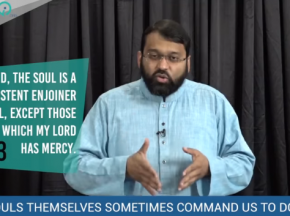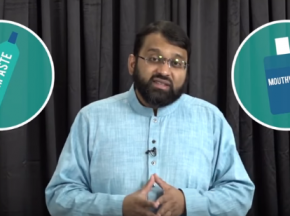content of level
Is it true that anyone die in madinah will enter paradise
Is it true that anyone die in madinah will enter paradise
is it permissible to celebrate mother's day in Islam
is it permissible to celebrate mother's day in Islam.
Temporary or Mutah Marriage
Temporary or Mutah Marriage - Assim al hakeem.
Can we pray Istekhara on behalf of others?
Can we pray Istekhara on behalf of others? Professional Aalims praying Istikhara - Assim al hakeem
The Prophet's Prayer from Authentic Ahadith
The Prophet's Prayer from Authentic Ahadith With Sheikh Assim Al Hakeem
He didn't pay a dowry then he married a second wife
He didn't pay a dowry then he married a second wife
Good Bid'ah vs Bad Bid'ah
Good Bid'ah vs Bad Bid'ah - Shaykh Dr Yasir Qadhi.
Why Do We Still Commit Sins In Ramadan If Shaytan Is Tied up
Why Do We Still Commit Sins In Ramadan If Shaytan Is Tied up - Shaykh Dr Yasir Qadhi
When Is Laylatul Qadr?
When Is Laylatul Qadr - Shaykh Dr Yasir Qadhi.
Can I Use Toothpaste And Mouthwash While I'm Fasting
Can I Use Toothpaste And Mouthwash While I'm Fasting - Shaykh Dr Yasir Qadhi
My Family Begins Or Ends Ramadan On A Different Day
My Family Begins Or Ends Ramadan On A Different Day - Shaykh Dr Yasir Qadhi
If a man has more than one wife, who will be his wife in Jannah?
If a man has more than one wife, who will be his wife in Jannah? Assim Al-Hakeem.
How should wife behave during Iddah period?
How should wife behave during Iddah period of first 2 divorces, what about intimacy? Assim al hakeem
Taking benefits by Cheating or Lying to the government
Taking benefits by Cheating or Lying to the government - Assim al hakeem.
My husband is not regular in prayer, am I a fornicator for sleeping with him?
My husband is not regular in prayer, am I a fornicator for sleeping with him? - Assim al hakeem.
Set alarm for Fajr, heard athan while half asleep, but went back to sleep
Set alarm for Fajr, heard athan while half asleep, but went back to sleep without praying- Assim Al-hakeem
Where should we look at while Praying when Standing, in Ruku, Tashahhud etc?
Where should we look at while Praying when Standing, in Ruku, Tashahhud etc? - Assim al hakeem
Should we praise Allah & say durood before making dua in sujood(Proper way of making dua)
Should we praise Allah & say durood before making dua in sujood(Proper way of making dua).
Getting old & still unmarried, I'm feeling Sad and Depressed, What to do?
Getting old & still unmarried, I'm feeling Sad and Depressed, What to do? - Assim al hakeem.
Can we make wudu with Oil or Gel on our hair?
Can we make wudu with Oil or Gel on our hair? - Assim al hakeem.




















